Effective and Ineffective Interpersonal Behavior Analysis
VerifiedAdded on 2021/05/31
|9
|2305
|33
Homework Assignment
AI Summary
This assignment analyzes a dialogue between a brother and sister, focusing on the application of interpersonal behavioral skills. The student, acting as the brother, reflects on their communication, highlighting the effective use of attentive listening, persuasion, and influence to encourage the sister to open up about a troubling issue. The analysis also identifies ineffective communication skills, such as being judgmental, not being concise, and failing to maintain adequate eye contact, which hindered the conversation. The student discusses how these ineffective behaviors created communication barriers and suggests alternative approaches to improve the interaction and foster a more positive outcome. The assignment draws on various academic references to support the analysis of interpersonal dynamics.

Running head: INTERPERSONAL BEHAVIOUR 1
Interpersonal behavior
Student name
University affiliation
Interpersonal behavior
Student name
University affiliation
Paraphrase This Document
Need a fresh take? Get an instant paraphrase of this document with our AI Paraphraser
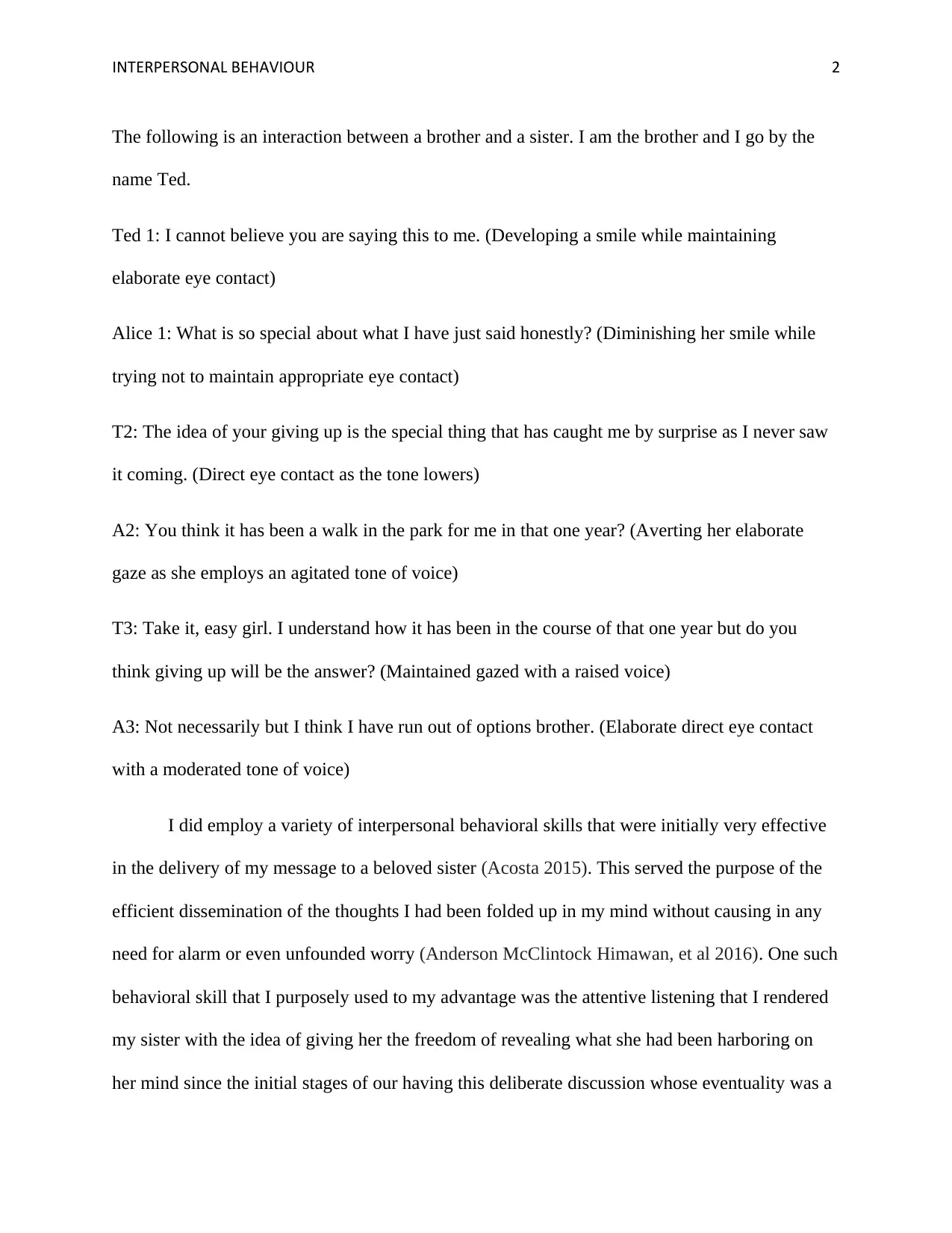
INTERPERSONAL BEHAVIOUR 2
The following is an interaction between a brother and a sister. I am the brother and I go by the
name Ted.
Ted 1: I cannot believe you are saying this to me. (Developing a smile while maintaining
elaborate eye contact)
Alice 1: What is so special about what I have just said honestly? (Diminishing her smile while
trying not to maintain appropriate eye contact)
T2: The idea of your giving up is the special thing that has caught me by surprise as I never saw
it coming. (Direct eye contact as the tone lowers)
A2: You think it has been a walk in the park for me in that one year? (Averting her elaborate
gaze as she employs an agitated tone of voice)
T3: Take it, easy girl. I understand how it has been in the course of that one year but do you
think giving up will be the answer? (Maintained gazed with a raised voice)
A3: Not necessarily but I think I have run out of options brother. (Elaborate direct eye contact
with a moderated tone of voice)
I did employ a variety of interpersonal behavioral skills that were initially very effective
in the delivery of my message to a beloved sister (Acosta 2015). This served the purpose of the
efficient dissemination of the thoughts I had been folded up in my mind without causing in any
need for alarm or even unfounded worry (Anderson McClintock Himawan, et al 2016). One such
behavioral skill that I purposely used to my advantage was the attentive listening that I rendered
my sister with the idea of giving her the freedom of revealing what she had been harboring on
her mind since the initial stages of our having this deliberate discussion whose eventuality was a
The following is an interaction between a brother and a sister. I am the brother and I go by the
name Ted.
Ted 1: I cannot believe you are saying this to me. (Developing a smile while maintaining
elaborate eye contact)
Alice 1: What is so special about what I have just said honestly? (Diminishing her smile while
trying not to maintain appropriate eye contact)
T2: The idea of your giving up is the special thing that has caught me by surprise as I never saw
it coming. (Direct eye contact as the tone lowers)
A2: You think it has been a walk in the park for me in that one year? (Averting her elaborate
gaze as she employs an agitated tone of voice)
T3: Take it, easy girl. I understand how it has been in the course of that one year but do you
think giving up will be the answer? (Maintained gazed with a raised voice)
A3: Not necessarily but I think I have run out of options brother. (Elaborate direct eye contact
with a moderated tone of voice)
I did employ a variety of interpersonal behavioral skills that were initially very effective
in the delivery of my message to a beloved sister (Acosta 2015). This served the purpose of the
efficient dissemination of the thoughts I had been folded up in my mind without causing in any
need for alarm or even unfounded worry (Anderson McClintock Himawan, et al 2016). One such
behavioral skill that I purposely used to my advantage was the attentive listening that I rendered
my sister with the idea of giving her the freedom of revealing what she had been harboring on
her mind since the initial stages of our having this deliberate discussion whose eventuality was a
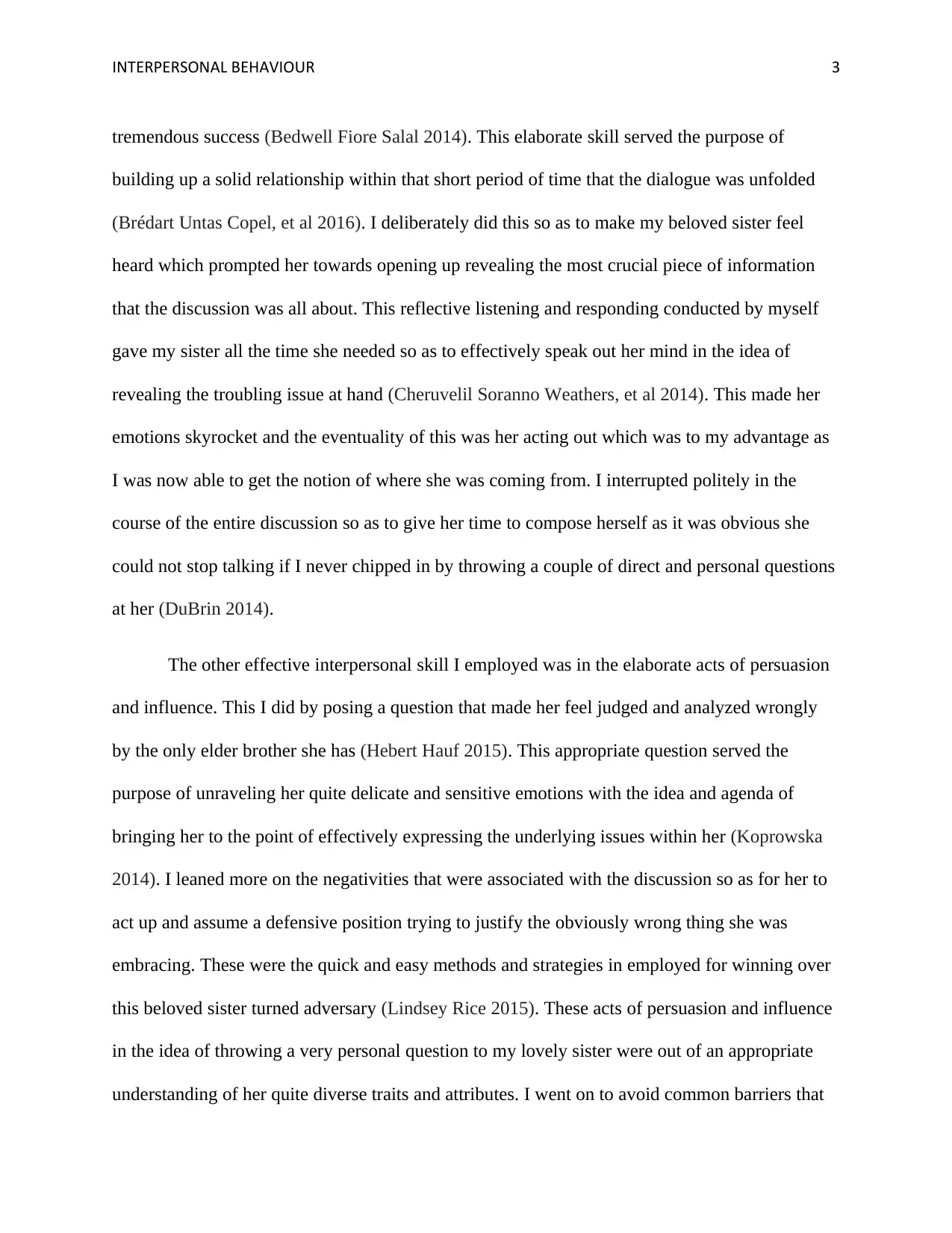
INTERPERSONAL BEHAVIOUR 3
tremendous success (Bedwell Fiore Salal 2014). This elaborate skill served the purpose of
building up a solid relationship within that short period of time that the dialogue was unfolded
(Brédart Untas Copel, et al 2016). I deliberately did this so as to make my beloved sister feel
heard which prompted her towards opening up revealing the most crucial piece of information
that the discussion was all about. This reflective listening and responding conducted by myself
gave my sister all the time she needed so as to effectively speak out her mind in the idea of
revealing the troubling issue at hand (Cheruvelil Soranno Weathers, et al 2014). This made her
emotions skyrocket and the eventuality of this was her acting out which was to my advantage as
I was now able to get the notion of where she was coming from. I interrupted politely in the
course of the entire discussion so as to give her time to compose herself as it was obvious she
could not stop talking if I never chipped in by throwing a couple of direct and personal questions
at her (DuBrin 2014).
The other effective interpersonal skill I employed was in the elaborate acts of persuasion
and influence. This I did by posing a question that made her feel judged and analyzed wrongly
by the only elder brother she has (Hebert Hauf 2015). This appropriate question served the
purpose of unraveling her quite delicate and sensitive emotions with the idea and agenda of
bringing her to the point of effectively expressing the underlying issues within her (Koprowska
2014). I leaned more on the negativities that were associated with the discussion so as for her to
act up and assume a defensive position trying to justify the obviously wrong thing she was
embracing. These were the quick and easy methods and strategies in employed for winning over
this beloved sister turned adversary (Lindsey Rice 2015). These acts of persuasion and influence
in the idea of throwing a very personal question to my lovely sister were out of an appropriate
understanding of her quite diverse traits and attributes. I went on to avoid common barriers that
tremendous success (Bedwell Fiore Salal 2014). This elaborate skill served the purpose of
building up a solid relationship within that short period of time that the dialogue was unfolded
(Brédart Untas Copel, et al 2016). I deliberately did this so as to make my beloved sister feel
heard which prompted her towards opening up revealing the most crucial piece of information
that the discussion was all about. This reflective listening and responding conducted by myself
gave my sister all the time she needed so as to effectively speak out her mind in the idea of
revealing the troubling issue at hand (Cheruvelil Soranno Weathers, et al 2014). This made her
emotions skyrocket and the eventuality of this was her acting out which was to my advantage as
I was now able to get the notion of where she was coming from. I interrupted politely in the
course of the entire discussion so as to give her time to compose herself as it was obvious she
could not stop talking if I never chipped in by throwing a couple of direct and personal questions
at her (DuBrin 2014).
The other effective interpersonal skill I employed was in the elaborate acts of persuasion
and influence. This I did by posing a question that made her feel judged and analyzed wrongly
by the only elder brother she has (Hebert Hauf 2015). This appropriate question served the
purpose of unraveling her quite delicate and sensitive emotions with the idea and agenda of
bringing her to the point of effectively expressing the underlying issues within her (Koprowska
2014). I leaned more on the negativities that were associated with the discussion so as for her to
act up and assume a defensive position trying to justify the obviously wrong thing she was
embracing. These were the quick and easy methods and strategies in employed for winning over
this beloved sister turned adversary (Lindsey Rice 2015). These acts of persuasion and influence
in the idea of throwing a very personal question to my lovely sister were out of an appropriate
understanding of her quite diverse traits and attributes. I went on to avoid common barriers that
⊘ This is a preview!⊘
Do you want full access?
Subscribe today to unlock all pages.

Trusted by 1+ million students worldwide
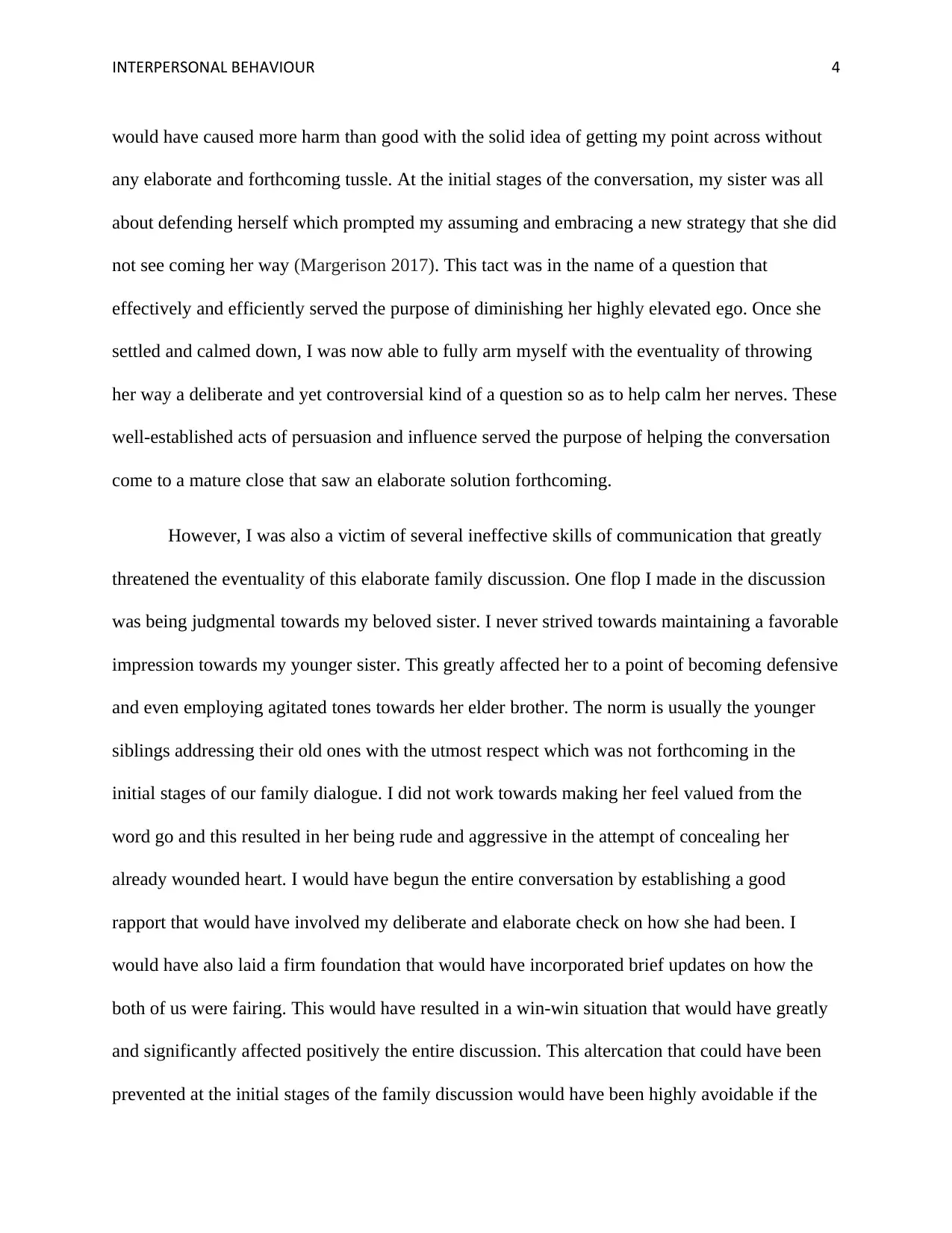
INTERPERSONAL BEHAVIOUR 4
would have caused more harm than good with the solid idea of getting my point across without
any elaborate and forthcoming tussle. At the initial stages of the conversation, my sister was all
about defending herself which prompted my assuming and embracing a new strategy that she did
not see coming her way (Margerison 2017). This tact was in the name of a question that
effectively and efficiently served the purpose of diminishing her highly elevated ego. Once she
settled and calmed down, I was now able to fully arm myself with the eventuality of throwing
her way a deliberate and yet controversial kind of a question so as to help calm her nerves. These
well-established acts of persuasion and influence served the purpose of helping the conversation
come to a mature close that saw an elaborate solution forthcoming.
However, I was also a victim of several ineffective skills of communication that greatly
threatened the eventuality of this elaborate family discussion. One flop I made in the discussion
was being judgmental towards my beloved sister. I never strived towards maintaining a favorable
impression towards my younger sister. This greatly affected her to a point of becoming defensive
and even employing agitated tones towards her elder brother. The norm is usually the younger
siblings addressing their old ones with the utmost respect which was not forthcoming in the
initial stages of our family dialogue. I did not work towards making her feel valued from the
word go and this resulted in her being rude and aggressive in the attempt of concealing her
already wounded heart. I would have begun the entire conversation by establishing a good
rapport that would have involved my deliberate and elaborate check on how she had been. I
would have also laid a firm foundation that would have incorporated brief updates on how the
both of us were fairing. This would have resulted in a win-win situation that would have greatly
and significantly affected positively the entire discussion. This altercation that could have been
prevented at the initial stages of the family discussion would have been highly avoidable if the
would have caused more harm than good with the solid idea of getting my point across without
any elaborate and forthcoming tussle. At the initial stages of the conversation, my sister was all
about defending herself which prompted my assuming and embracing a new strategy that she did
not see coming her way (Margerison 2017). This tact was in the name of a question that
effectively and efficiently served the purpose of diminishing her highly elevated ego. Once she
settled and calmed down, I was now able to fully arm myself with the eventuality of throwing
her way a deliberate and yet controversial kind of a question so as to help calm her nerves. These
well-established acts of persuasion and influence served the purpose of helping the conversation
come to a mature close that saw an elaborate solution forthcoming.
However, I was also a victim of several ineffective skills of communication that greatly
threatened the eventuality of this elaborate family discussion. One flop I made in the discussion
was being judgmental towards my beloved sister. I never strived towards maintaining a favorable
impression towards my younger sister. This greatly affected her to a point of becoming defensive
and even employing agitated tones towards her elder brother. The norm is usually the younger
siblings addressing their old ones with the utmost respect which was not forthcoming in the
initial stages of our family dialogue. I did not work towards making her feel valued from the
word go and this resulted in her being rude and aggressive in the attempt of concealing her
already wounded heart. I would have begun the entire conversation by establishing a good
rapport that would have involved my deliberate and elaborate check on how she had been. I
would have also laid a firm foundation that would have incorporated brief updates on how the
both of us were fairing. This would have resulted in a win-win situation that would have greatly
and significantly affected positively the entire discussion. This altercation that could have been
prevented at the initial stages of the family discussion would have been highly avoidable if the
Paraphrase This Document
Need a fresh take? Get an instant paraphrase of this document with our AI Paraphraser
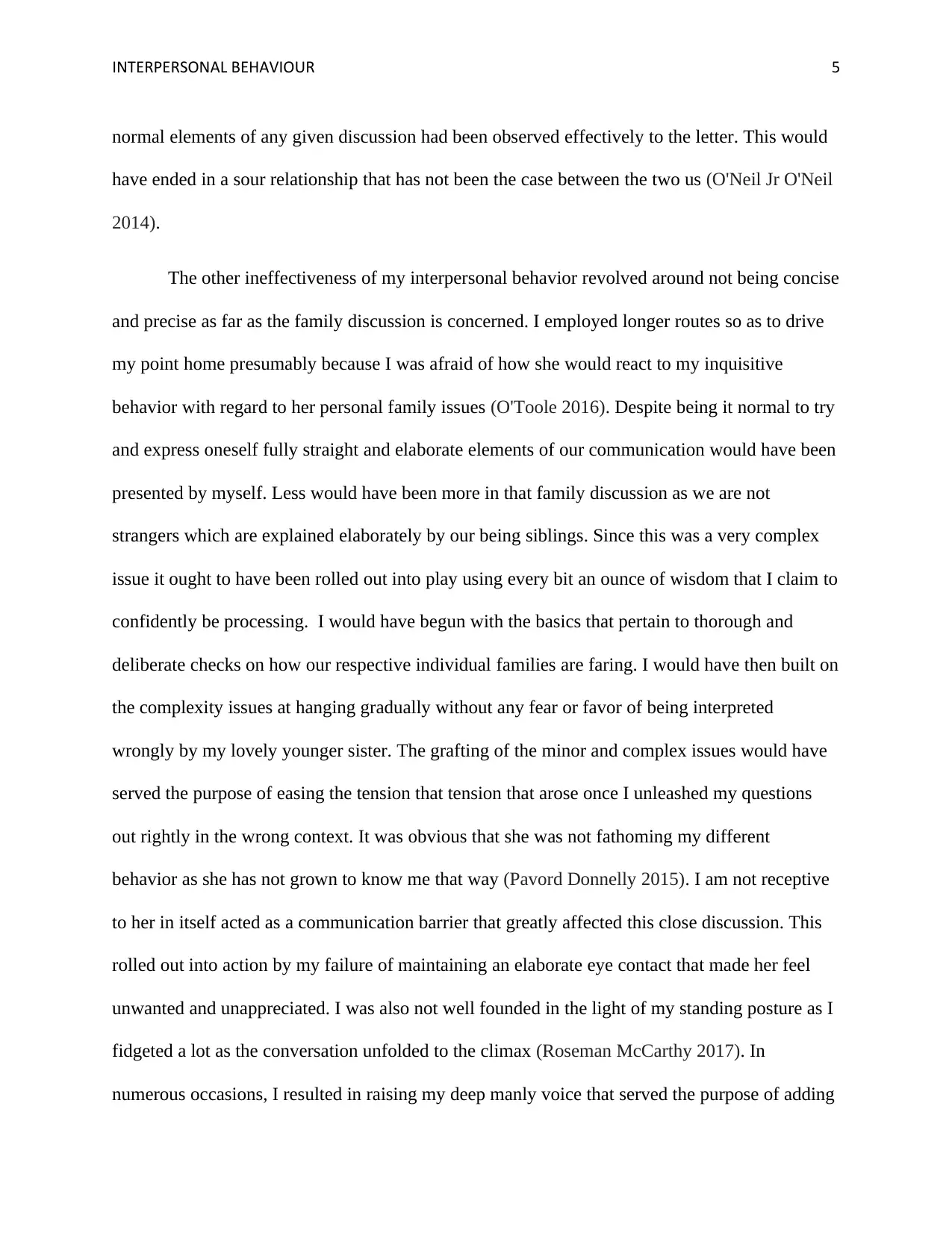
INTERPERSONAL BEHAVIOUR 5
normal elements of any given discussion had been observed effectively to the letter. This would
have ended in a sour relationship that has not been the case between the two us (O'Neil Jr O'Neil
2014).
The other ineffectiveness of my interpersonal behavior revolved around not being concise
and precise as far as the family discussion is concerned. I employed longer routes so as to drive
my point home presumably because I was afraid of how she would react to my inquisitive
behavior with regard to her personal family issues (O'Toole 2016). Despite being it normal to try
and express oneself fully straight and elaborate elements of our communication would have been
presented by myself. Less would have been more in that family discussion as we are not
strangers which are explained elaborately by our being siblings. Since this was a very complex
issue it ought to have been rolled out into play using every bit an ounce of wisdom that I claim to
confidently be processing. I would have begun with the basics that pertain to thorough and
deliberate checks on how our respective individual families are faring. I would have then built on
the complexity issues at hanging gradually without any fear or favor of being interpreted
wrongly by my lovely younger sister. The grafting of the minor and complex issues would have
served the purpose of easing the tension that tension that arose once I unleashed my questions
out rightly in the wrong context. It was obvious that she was not fathoming my different
behavior as she has not grown to know me that way (Pavord Donnelly 2015). I am not receptive
to her in itself acted as a communication barrier that greatly affected this close discussion. This
rolled out into action by my failure of maintaining an elaborate eye contact that made her feel
unwanted and unappreciated. I was also not well founded in the light of my standing posture as I
fidgeted a lot as the conversation unfolded to the climax (Roseman McCarthy 2017). In
numerous occasions, I resulted in raising my deep manly voice that served the purpose of adding
normal elements of any given discussion had been observed effectively to the letter. This would
have ended in a sour relationship that has not been the case between the two us (O'Neil Jr O'Neil
2014).
The other ineffectiveness of my interpersonal behavior revolved around not being concise
and precise as far as the family discussion is concerned. I employed longer routes so as to drive
my point home presumably because I was afraid of how she would react to my inquisitive
behavior with regard to her personal family issues (O'Toole 2016). Despite being it normal to try
and express oneself fully straight and elaborate elements of our communication would have been
presented by myself. Less would have been more in that family discussion as we are not
strangers which are explained elaborately by our being siblings. Since this was a very complex
issue it ought to have been rolled out into play using every bit an ounce of wisdom that I claim to
confidently be processing. I would have begun with the basics that pertain to thorough and
deliberate checks on how our respective individual families are faring. I would have then built on
the complexity issues at hanging gradually without any fear or favor of being interpreted
wrongly by my lovely younger sister. The grafting of the minor and complex issues would have
served the purpose of easing the tension that tension that arose once I unleashed my questions
out rightly in the wrong context. It was obvious that she was not fathoming my different
behavior as she has not grown to know me that way (Pavord Donnelly 2015). I am not receptive
to her in itself acted as a communication barrier that greatly affected this close discussion. This
rolled out into action by my failure of maintaining an elaborate eye contact that made her feel
unwanted and unappreciated. I was also not well founded in the light of my standing posture as I
fidgeted a lot as the conversation unfolded to the climax (Roseman McCarthy 2017). In
numerous occasions, I resulted in raising my deep manly voice that served the purpose of adding

INTERPERSONAL BEHAVIOUR 6
salt to an injury. This made her feel as if she was placed between a rock and a hard place which
explains her eventual outbursts that vividly threatened this well-established close discussion.
These elements of ineffective interpersonal behavior could have been avoided if various
factors had been put under close and thorough consideration. One way is my letting go of a
judgmental kind of an attitude that would have greatly affected the family discussion (Slaughter
Christian Podsakoff, et al 2014). My jumping into conclusion with regard to whatever she had
told me would have been left in the discussion with my wanting to know more of what would
have transpired between my sister and her spouse necessitating her making such questionable
remarks about him. Our being blood siblings served the purpose of our taking it easy and lightly
whatever the both of us uttered against the other. This blood relation explains why the entire
discussion ends on a very good note as a mutual agreement is arrived at eventually. Our very
close relationship in terms of our also being friends served the purpose of enhancing the good
eventuality of the entire family discussion (Stickley Gosling Fox, et al 2017).
salt to an injury. This made her feel as if she was placed between a rock and a hard place which
explains her eventual outbursts that vividly threatened this well-established close discussion.
These elements of ineffective interpersonal behavior could have been avoided if various
factors had been put under close and thorough consideration. One way is my letting go of a
judgmental kind of an attitude that would have greatly affected the family discussion (Slaughter
Christian Podsakoff, et al 2014). My jumping into conclusion with regard to whatever she had
told me would have been left in the discussion with my wanting to know more of what would
have transpired between my sister and her spouse necessitating her making such questionable
remarks about him. Our being blood siblings served the purpose of our taking it easy and lightly
whatever the both of us uttered against the other. This blood relation explains why the entire
discussion ends on a very good note as a mutual agreement is arrived at eventually. Our very
close relationship in terms of our also being friends served the purpose of enhancing the good
eventuality of the entire family discussion (Stickley Gosling Fox, et al 2017).
⊘ This is a preview!⊘
Do you want full access?
Subscribe today to unlock all pages.

Trusted by 1+ million students worldwide
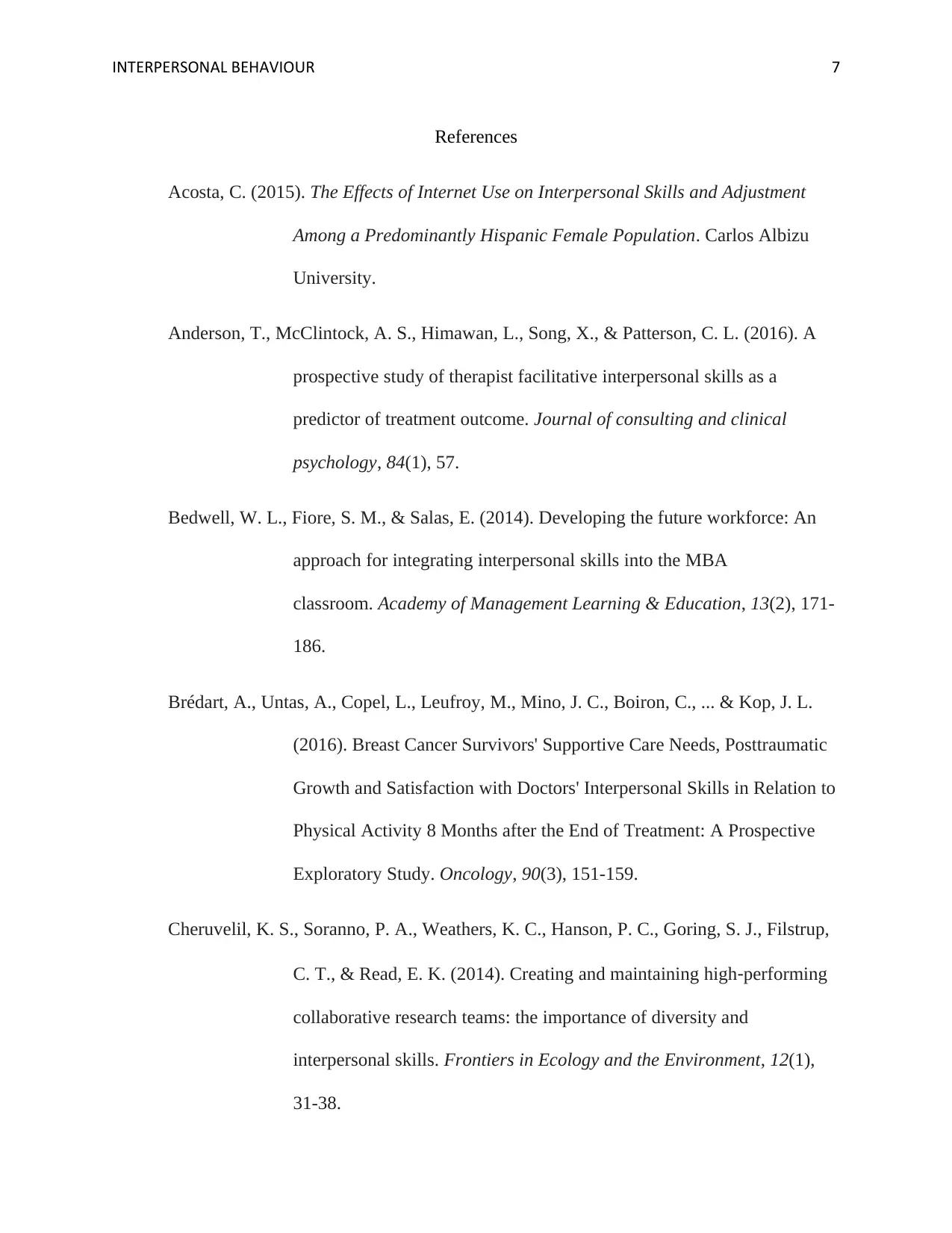
INTERPERSONAL BEHAVIOUR 7
References
Acosta, C. (2015). The Effects of Internet Use on Interpersonal Skills and Adjustment
Among a Predominantly Hispanic Female Population. Carlos Albizu
University.
Anderson, T., McClintock, A. S., Himawan, L., Song, X., & Patterson, C. L. (2016). A
prospective study of therapist facilitative interpersonal skills as a
predictor of treatment outcome. Journal of consulting and clinical
psychology, 84(1), 57.
Bedwell, W. L., Fiore, S. M., & Salas, E. (2014). Developing the future workforce: An
approach for integrating interpersonal skills into the MBA
classroom. Academy of Management Learning & Education, 13(2), 171-
186.
Brédart, A., Untas, A., Copel, L., Leufroy, M., Mino, J. C., Boiron, C., ... & Kop, J. L.
(2016). Breast Cancer Survivors' Supportive Care Needs, Posttraumatic
Growth and Satisfaction with Doctors' Interpersonal Skills in Relation to
Physical Activity 8 Months after the End of Treatment: A Prospective
Exploratory Study. Oncology, 90(3), 151-159.
Cheruvelil, K. S., Soranno, P. A., Weathers, K. C., Hanson, P. C., Goring, S. J., Filstrup,
C. T., & Read, E. K. (2014). Creating and maintaining high‐performing
collaborative research teams: the importance of diversity and
interpersonal skills. Frontiers in Ecology and the Environment, 12(1),
31-38.
References
Acosta, C. (2015). The Effects of Internet Use on Interpersonal Skills and Adjustment
Among a Predominantly Hispanic Female Population. Carlos Albizu
University.
Anderson, T., McClintock, A. S., Himawan, L., Song, X., & Patterson, C. L. (2016). A
prospective study of therapist facilitative interpersonal skills as a
predictor of treatment outcome. Journal of consulting and clinical
psychology, 84(1), 57.
Bedwell, W. L., Fiore, S. M., & Salas, E. (2014). Developing the future workforce: An
approach for integrating interpersonal skills into the MBA
classroom. Academy of Management Learning & Education, 13(2), 171-
186.
Brédart, A., Untas, A., Copel, L., Leufroy, M., Mino, J. C., Boiron, C., ... & Kop, J. L.
(2016). Breast Cancer Survivors' Supportive Care Needs, Posttraumatic
Growth and Satisfaction with Doctors' Interpersonal Skills in Relation to
Physical Activity 8 Months after the End of Treatment: A Prospective
Exploratory Study. Oncology, 90(3), 151-159.
Cheruvelil, K. S., Soranno, P. A., Weathers, K. C., Hanson, P. C., Goring, S. J., Filstrup,
C. T., & Read, E. K. (2014). Creating and maintaining high‐performing
collaborative research teams: the importance of diversity and
interpersonal skills. Frontiers in Ecology and the Environment, 12(1),
31-38.
Paraphrase This Document
Need a fresh take? Get an instant paraphrase of this document with our AI Paraphraser
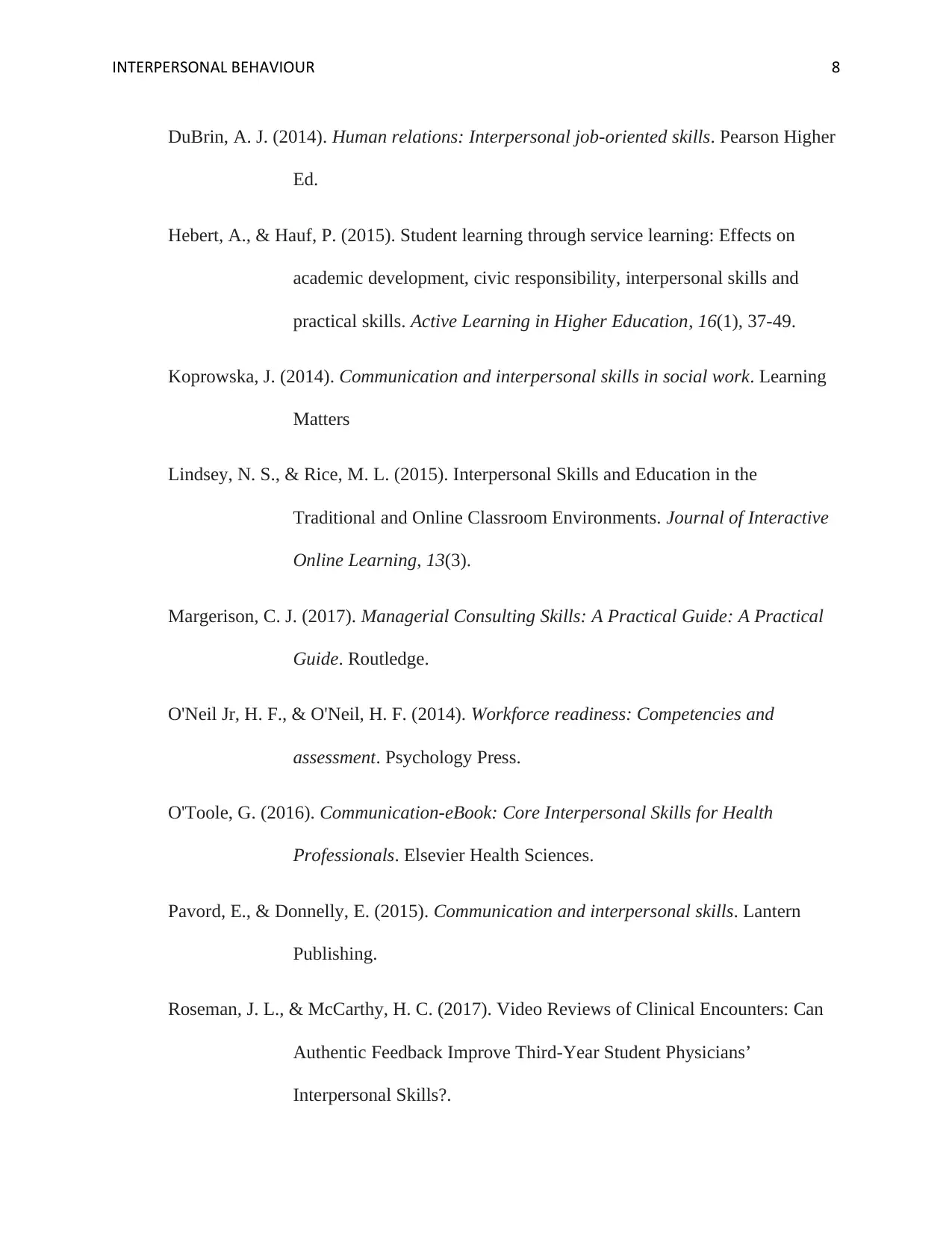
INTERPERSONAL BEHAVIOUR 8
DuBrin, A. J. (2014). Human relations: Interpersonal job-oriented skills. Pearson Higher
Ed.
Hebert, A., & Hauf, P. (2015). Student learning through service learning: Effects on
academic development, civic responsibility, interpersonal skills and
practical skills. Active Learning in Higher Education, 16(1), 37-49.
Koprowska, J. (2014). Communication and interpersonal skills in social work. Learning
Matters
Lindsey, N. S., & Rice, M. L. (2015). Interpersonal Skills and Education in the
Traditional and Online Classroom Environments. Journal of Interactive
Online Learning, 13(3).
Margerison, C. J. (2017). Managerial Consulting Skills: A Practical Guide: A Practical
Guide. Routledge.
O'Neil Jr, H. F., & O'Neil, H. F. (2014). Workforce readiness: Competencies and
assessment. Psychology Press.
O'Toole, G. (2016). Communication-eBook: Core Interpersonal Skills for Health
Professionals. Elsevier Health Sciences.
Pavord, E., & Donnelly, E. (2015). Communication and interpersonal skills. Lantern
Publishing.
Roseman, J. L., & McCarthy, H. C. (2017). Video Reviews of Clinical Encounters: Can
Authentic Feedback Improve Third-Year Student Physicians’
Interpersonal Skills?.
DuBrin, A. J. (2014). Human relations: Interpersonal job-oriented skills. Pearson Higher
Ed.
Hebert, A., & Hauf, P. (2015). Student learning through service learning: Effects on
academic development, civic responsibility, interpersonal skills and
practical skills. Active Learning in Higher Education, 16(1), 37-49.
Koprowska, J. (2014). Communication and interpersonal skills in social work. Learning
Matters
Lindsey, N. S., & Rice, M. L. (2015). Interpersonal Skills and Education in the
Traditional and Online Classroom Environments. Journal of Interactive
Online Learning, 13(3).
Margerison, C. J. (2017). Managerial Consulting Skills: A Practical Guide: A Practical
Guide. Routledge.
O'Neil Jr, H. F., & O'Neil, H. F. (2014). Workforce readiness: Competencies and
assessment. Psychology Press.
O'Toole, G. (2016). Communication-eBook: Core Interpersonal Skills for Health
Professionals. Elsevier Health Sciences.
Pavord, E., & Donnelly, E. (2015). Communication and interpersonal skills. Lantern
Publishing.
Roseman, J. L., & McCarthy, H. C. (2017). Video Reviews of Clinical Encounters: Can
Authentic Feedback Improve Third-Year Student Physicians’
Interpersonal Skills?.
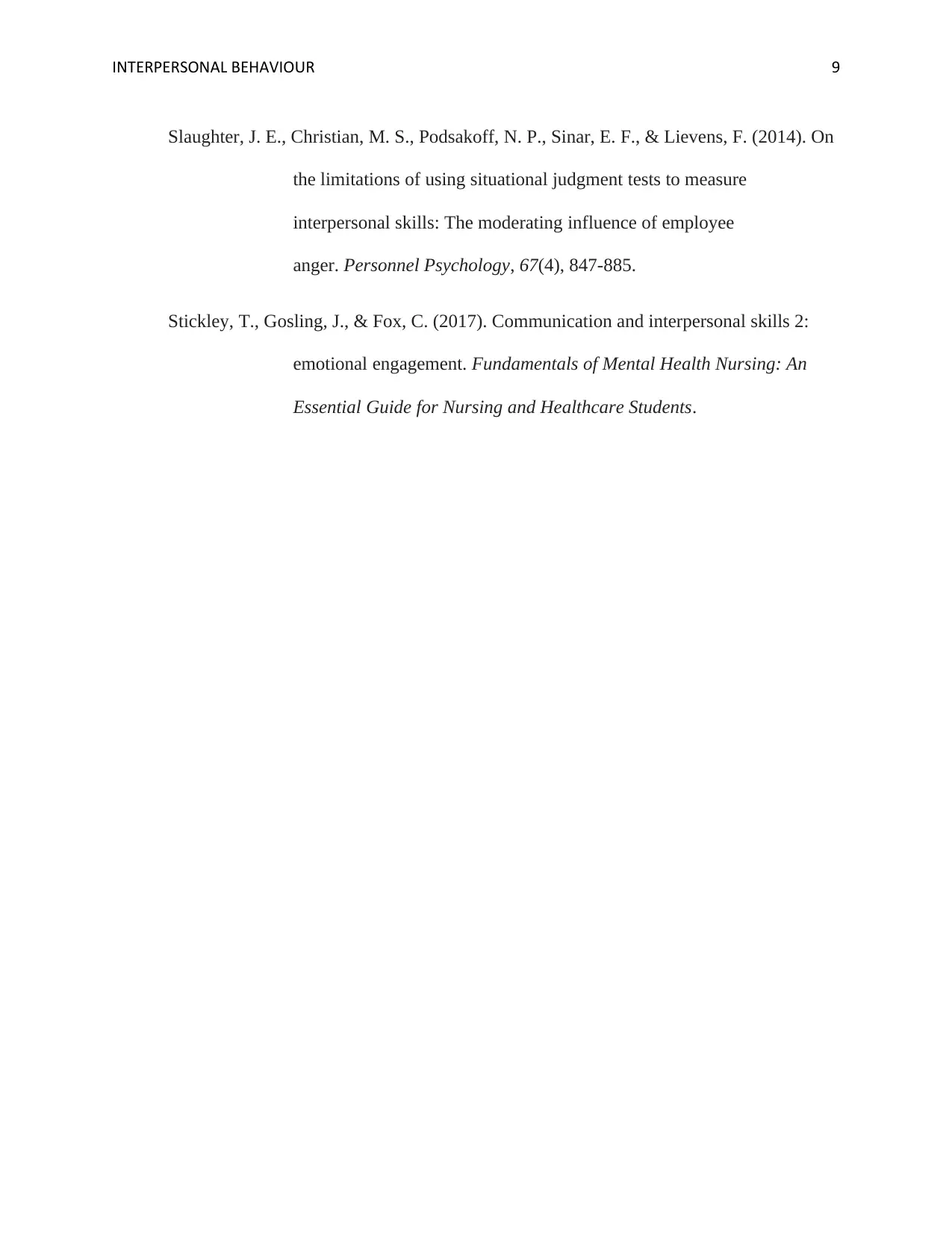
INTERPERSONAL BEHAVIOUR 9
Slaughter, J. E., Christian, M. S., Podsakoff, N. P., Sinar, E. F., & Lievens, F. (2014). On
the limitations of using situational judgment tests to measure
interpersonal skills: The moderating influence of employee
anger. Personnel Psychology, 67(4), 847-885.
Stickley, T., Gosling, J., & Fox, C. (2017). Communication and interpersonal skills 2:
emotional engagement. Fundamentals of Mental Health Nursing: An
Essential Guide for Nursing and Healthcare Students.
Slaughter, J. E., Christian, M. S., Podsakoff, N. P., Sinar, E. F., & Lievens, F. (2014). On
the limitations of using situational judgment tests to measure
interpersonal skills: The moderating influence of employee
anger. Personnel Psychology, 67(4), 847-885.
Stickley, T., Gosling, J., & Fox, C. (2017). Communication and interpersonal skills 2:
emotional engagement. Fundamentals of Mental Health Nursing: An
Essential Guide for Nursing and Healthcare Students.
⊘ This is a preview!⊘
Do you want full access?
Subscribe today to unlock all pages.

Trusted by 1+ million students worldwide
1 out of 9
Related Documents
Your All-in-One AI-Powered Toolkit for Academic Success.
+13062052269
info@desklib.com
Available 24*7 on WhatsApp / Email
![[object Object]](/_next/static/media/star-bottom.7253800d.svg)
Unlock your academic potential
Copyright © 2020–2026 A2Z Services. All Rights Reserved. Developed and managed by ZUCOL.





